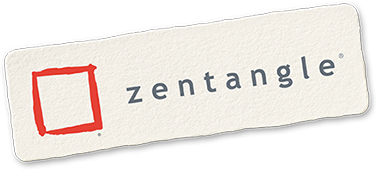In recognition of Mental Health Awareness Month and our collaboration with UMass MIND of the University of Massachusetts Medical School, we would like to share studies around the general benefits of creating art and the use of the Zentangle Method for individuals with serious mental illness.
If you are an avid tangler, you may not need another excuse to tangle, but here are some benefits of creating art:
- Engaging in visual arts has been shown to improve emotional regulation, or the control we have over our emotional state in a diverse range of stressful situations, as well as overall well-being (Drake, 2021; Pipere et al., 2020).
- Art making has also been shown to allow individuals to foster better interpersonal skills that allow them to connect better with others, in terms of recognizing emotions and being able to empathize with them (Kastner et al., 2021).
- Creating art has been found to significantly reduce stress levels and anxiety (Martin et al., 2018).
- Art engagement has also been shown to reduce anger and improve self-esteem (Alavinezhad et al., 2014; Kelly & Doherty, 2017).
In the past years, art-based therapies have been growing in popularity to address these unmet needs. An important aspect of these therapies that has been gaining traction is mindfulness, the concept of staying present and grounded in the moment and paying particular attention to one’s activities and feelings.
The Zentangle Method has been identified as a form of mindfulness-based art intervention in which people are able to channel creativity through drawing simple, easy to learn, repetitive patterns. The method fosters the creation of a non-judgmental environment in which people can overcome the fear of mistakes, improve self-image, and foster a sense of pride in one’s unique creation.
People with serious mental illness (SMI), such as schizophrenia, bipolar disorder, or major depressive disorder, often struggle with feelings of helplessness, low self-esteem, and the ability to express themselves. These individuals, often treated with medication, are still left with unmet needs regarding psychological well-being, such as emotional expressiveness, regulation skills and confidence.
In 2021, The Zentangle Foundation partnered with UMass MIND, a clinical and research program dedicated to improving the lives on individuals with SMI, to investigate the Zentangle Method as an adjunctive treatment for SMI. The 14-week study included an 8-week Zentangle program conducted in a group format over zoom, led by Certified Zentangle Teachers. Participants met once a week for a 90-minute session. These sessions focused on the fundamental principles of the Zentangle Method, and with each successive session, participants were encouraged to explore new designs incorporating the skills they learned in past sessions.
The study measured the psychiatric symptoms, mindfulness, and quality of life of the study participants.
The study found that participants had a significant decrease in the severity psychiatric symptoms and an increase in levels of mindfulness after the intervention. Participants expressed satisfaction with the Zentangle Method and continued use of the Zentangle Method after the intervention as means of a creative outlet. The study findings were presented at the American Psychiatric Association annual meeting in 2022 and are currently under review for publication.
With the success of this pilot study, UMass MIND and The Zentangle Foundation hope to further pursue research looking into the effectiveness of the Zentangle Method as a mindful-based art intervention for the SMI population.
For more information about The Zentangle Foundation’s work with UMass MIND and how you can support it, please contact Jen@zentangle.com or visit zentanglefoundation.org
A special Thank You to Brenna Chuang from UMass Mind for her contributions to this blog post. For more information about UMass MIND, please visit their website here: www.umassmed.edu/umass-mind
Facebook & Instagram: @umassmind



Love this stud. It’s awesome work and results. I would love to hear more in the non-therapy stage of CZTs, for example, in the facilitation stage in the healing arts. Those of us working in the community or with organizations in more of the grass-roots or social
-based community environment.
Miriam Zimms on
Deeply convinced this is a matter of time. Having Zentangle present in some studies about mental health make me believe, we as CZTs can never forget about this part. We get really beautiful treasures with every tile, but those fresh and constructive moments of relaxation make our creativity to flow. And that’s even more valid and reassuring.🤗🤗🙏🙏
Os Burbano on
When we returned, half a dozen of the girls came running towards us to show the several pages of their artwork they had created in the intervening period.
The second intervention was a couple of years later in the US at a rehab center. Around 40 hard core drug addicts, alcoholics, and other psychiatric patients were undergoing treatment. Their severe withdrawal symptom were manifested in their anxiety, body pain and sleeplessness. They were not able to sit through even a 45 minutes of psychotherapy session without disrupting it.
However, all praise to the Zentangle method, they all sat through the 150 minutes of our intervention very peacefully, and endorsed it as a very calming process. One of the inmates even said that this process ‘could tame the beast within them!’.
I believe Zentangle method is a great boon waiting to be exploited in multiple situations.
Dilip Patel CZT09 on
Veronica Hodges on
I discovered Zentangling at the beginning of covid. I used your YouTube videos to help me get familiar with the method. It helped me personally with decreasing my anxiety and depression. I use it my art quilting now, and hopes that someday I can share with a mental health clinic/hospital that helped me during covid.
Pamela M. Pandolfi on
Dominique MARTIN on
Dominique MARTIN on
Susan C. on
Bringing the Zentangle method to the masses! And underlining what we as members of the community have known for a long time, that the power within the pen and pencil is real. How nice to have it “officially” be validated.
Ginger White CZT34 on